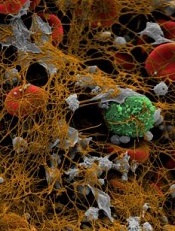
Credit: Andre E.X. Brown
An advisory committee is recommending that the US Food and Drug Administration (FDA) approve the antiplatelet agent vorapaxar as prophylaxis for atherothrombotic events in patients with a history of myocardial infarction.
The committee voted 10-1 in favor of vorapaxar, saying trial data suggest the drug’s potential benefits outweigh the risks for this patient population.
The FDA will take this opinion into account when deciding whether or not to approve the drug.
The committee evaluated data from the TRA 2P-TIMI 50 and TRACER trials.
In the TRACER study, researchers compared vorapaxar to placebo in 12,944 patients who had acute coronary syndromes without ST-segment elevation.
The trial was terminated early due to a significantly increased risk of bleeding in patients receiving vorapaxar. Rates of moderate and severe bleeding were 7.2% in the vorapaxar arm and 5.2% in the placebo arm (P<0.001). And the rates of intracranial hemorrhage were 1.1% and 0.2%, respectively (P<0.001).
The TRA 2P-TIMI 50 trial also showed an increased risk of bleeding with vorapaxar. In that study, investigators compared the drug to placebo in 26,449 patients with a history of myocardial infarction, ischemic stroke, or peripheral arterial disease.
Moderate or severe bleeding occurred in 4.2% of vorapaxar-treated patients and 2.5% of patients in the placebo arm (P<0.001). The rates of intracranial hemorrhage were 1.0% and 0.5%, respectively (P<0.001).
However, data from this trial also showed that vorapaxar can prevent thrombosis and decrease the likelihood of cardiac events.
And a subgroup analysis of patients with a history of myocardial infarction suggested the drug can reduce vascular events in these patients without increasing the risk of intracranial hemorrhage, although it did increase the risk of moderate or severe bleeding.
These results prompted the drug’s developer, Merck, to file a New Drug Application for vorapaxar to treat patients with a history of myocardial infarction, and not those with a history of ischemic stroke or peripheral arterial disease.
The FDA advisory committee agreed with the company’s decision to exclude patients with a history of ischemic stroke, but not those with peripheral arterial disease, as there were no significant safety issues in this population.
The committee also expressed concerns about some of the trial data, including analyses suggesting worse outcomes with vorapaxar in patients weighing less than 60 kg.
Nevertheless, the committee concluded that, overall, the benefits of vorapaxar outweigh the risks.
For more details and vorapaxar data, see the briefing information compiled for the advisory committee’s meeting.

